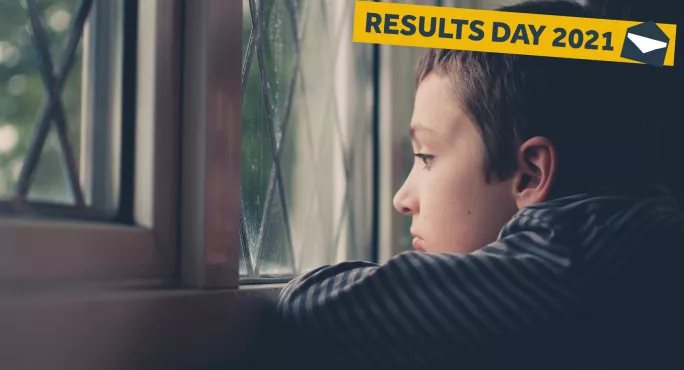
SQA results day 2021: Attainment gap wider than in 2020

SQA results day data shows attainment gaps between the most and least deprived students slightly wider than last year, although still narrower than before the pandemic .
Scottish Qualifications Authority (SQA) figures reveal that those in the most deprived areas (using a system of measuring poverty that puts students into one of five levels) achieved A to C grades at a lower rate than those in the least deprived areas.
For Higher results, the difference went from 6.5 percentage points in 2020 to 7.9 in 2021.
Both were down considerably from the 16.9 percentage point gap in 2019, before the Covid pandemic.
LIVE: SQA results day 2021
Scottish results day: A-grade passes hit record high on SQA results day 2021
SQA results day 2021: Pass rates drop across the board
Scottish results day 2021: Brighter days lie ahead after SQA 2021 results on Tuesday
SQA results 2021: Should SQA exams be scrapped in push for change?
SQA results day 2021: What now after ‘most stressful’ year?
The SQA said the different assessment models used in the wake of coronavirus made it difficult to compare the slight difference in the figures in 2020 and 2021.
The usual national SQA exams were scrapped as a result of the pandemic, with a teacher-led “alternative certification model” (ACM) taking place in the most recent year.
Tackling the “poverty-related attainment gap” has been a key goal for the Scottish government.
Discussing the attainment gap during a media briefing today, SQA chief executive Fiona Robertson said a number of issues influenced results between years.
She said: “Learners have faced disruption to learning and teaching this year.
“The Scottish government’s equity audit highlighted some of the challenges young people have faced that go beyond assessment.
“We’ve modified approaches to assessment to address disruption to learning, providing additional flexibility to deal with exceptional circumstances of this year.”
She said there had been movements in the attainment gap each year, while the overall gap had narrowed since 2017.
The Scottish Conservatives highlighted the pass rate for pupils from the most deprived areas had fallen at a faster rate than those from the least deprived.
Education spokesperson Oliver Mundell said: “They are twice as likely to see their grades fall at Higher and Advanced Higher than children from the most affluent areas, year-on-year.
“That is nothing short of a disgrace.”
He said the system had judged pupils in general “more harshly” than last year, adding: “Compared to last year, grades are down across the board. The attainment gap is up.
“That should set alarm bells ringing that this year’s system is just as flawed and unfair as the shambles pupils suffered last year.
“It is apparent that once again, young people have been judged because of where they come from and where they go to school.”
Scottish Greens education spokesperson Ross Greer said: “Just like last year’s postcode-based moderation system before it was reversed, this year’s grades were adjusted against previous results at each school.
“It’s therefore not a surprise that the attainment gap has widened. After all, the restored grades from last year, when the attainment gap dramatically narrowed, were excluded from this moderation system.
“This intense suspicion of working-class young people who achieve just as much as their middle-class colleagues shames Scotland.
“The purpose of education is to enable every young person to reach their full potential, not to sort the world into haves and have-nots based on where they live. The SQA’s leadership has again failed to understand this basic idea.”
Scottish Labour education spokesperson Michael Marra accused the education authorities of a “total lack of leadership”.
He said: “This system has widened the educational attainment gap in Scotland, meaning that poorest pupils have been impacted the worst by the SQA and Scottish government mismanagement.
“The result is that there are many young people, particularly in our poorest communities, who have not achieved the grades they had hoped, or deserved.”
He called for a “resit guarantee” and the offer of a college place to anyone hit by the pandemic who wants to retake their subjects.
Education secretary Shirley-Anne Somerville said: “Closing the poverty-related attainment gap and ensuring every young person has the chance to fulfil their potential remains central to our work.
“We know that the challenges presented by the pandemic mean our efforts to deliver equity in education are more vital than ever, so we are investing a further £1 billion over the course of this Parliament to help close the gap.”
You need a Tes subscription to read this article
Subscribe now to read this article and get other subscriber-only content:
- Unlimited access to all Tes magazine content
- Exclusive subscriber-only stories
- Award-winning email newsletters
- Unlimited access to all Tes magazine content
- Exclusive subscriber-only stories
- Award-winning email newsletters
You need a subscription to read this article
Subscribe now to read this article and get other subscriber-only content, including:
- Unlimited access to all Tes magazine content
- Exclusive subscriber-only stories
- Award-winning email newsletters
- Unlimited access to all Tes magazine content
- Exclusive subscriber-only stories
- Award-winning email newsletters
topics in this article



